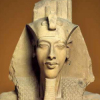Akhenaton

Akhenaton
Akhenatenknown before the fifth year of his reign as Amenhotep IV, was an Ancient Egyptian pharaoh of the Eighteenth Dynasty who ruled for 17 years and died perhaps in 1336 BC or 1334 BC. He is especially noted for abandoning traditional Egyptian polytheism and introducing worship centered on the Aten, which is sometimes described monolatristic, henotheistic, or even quasi-monotheistic. An early inscription likens the Aten to the sun as compared to stars, and later official language avoids calling the Aten...
NationalityEgyptian
ProfessionStatesman
CountryEgypt
Why seeketh thou revenge, O man! with what purpose is it that thou pursuest it? Thinkest thou to pain thine adversary by it? Know that thou thyself feelest its greatest torments.
The heart of the hypocrite is hid in his breast he masketh his words in the semblance of truth, while the business of his life is only to deceive.
Be upright in thy whole life; be content in all its changes;so shalt thou make thy profit out of all occurrences; so shall everything that happeneth unto thee be the source of praise
Thinking, understanding, reasoning, willing, call not these Soul They are its actions, but they are not its essence.
Know thyself as the pride of His creation, the link uniting divinity and matter; behold a part of God Himself within thee; remember thine own dignity nor dare descend to evil or meanness.
As the moon retaineth her nature, though darkness spread itself before her face as a curtain, so the Soul remaineth perfect even in the bosom of the fool.
Scorn also to depress thy competitor by any dishonest or unworthy method; strive to raise thyself above him only by excelling him; so shall thy contest for superiority be crowned with honour, if not with success.
Honor is the inner garment of the Soul; the first thing put on by it with the flesh, and the last it layeth down at its separation from it.
Contemplate thy powers, contemplate thy wants and thy connections; so shalt thou discover the duties of life, and be directed in all thy ways.
In all thy undertakings, let a reasonable assurance animate thy endeavors if thou despairest of success, thou shalt not succeed.
What is the source of sadness, but feebleness of the mind? What giveth it power but the want of reason? Rouse thyself to the combat, and she quitteth the field before thou strikest.
True wisdom is less presuming than folly. The wise man doubteth often, and changeth his mind; the fool is obstinate, and doubteth not; he knoweth all things but his own ignorance.
A contented mind is a hidden treasure, and trouble findeth it not.
As a rock on the seashore he standeth firm, and the dashing of the waves disturbeth him not. He raiseth his head like a tower on a hill, and the arrows of fortune drop at his feet. In the instant of danger, the courage of his heart here, and scorn to fly.